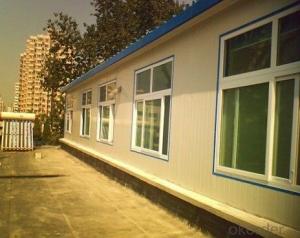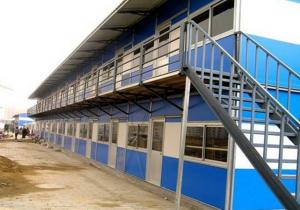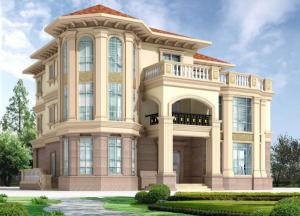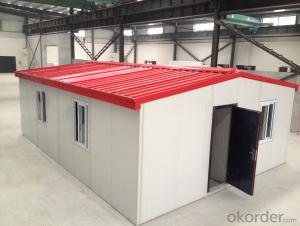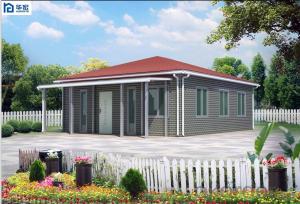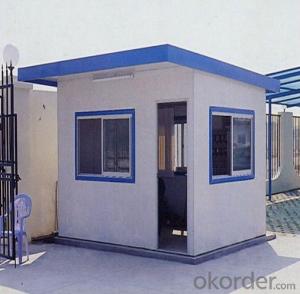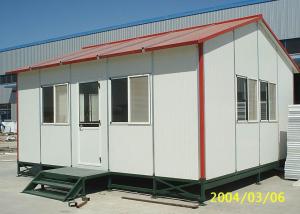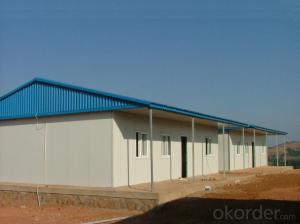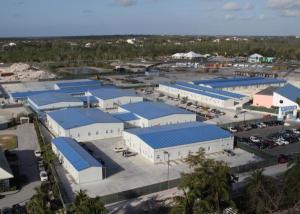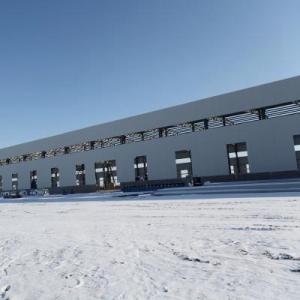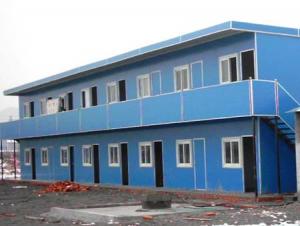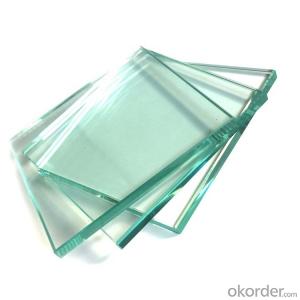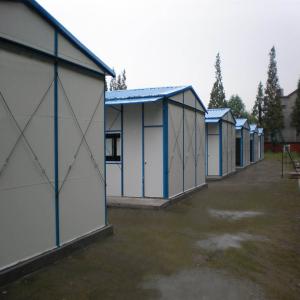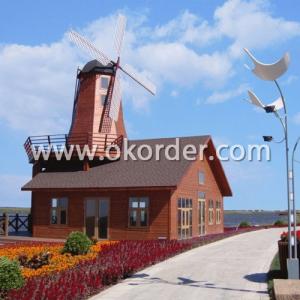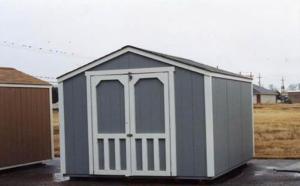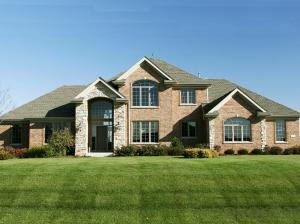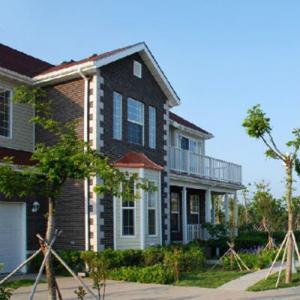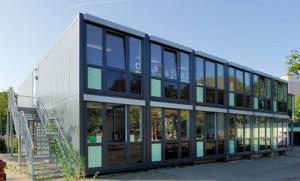Prefabricated housing, modular housing
OKorder Service Pledge
OKorder Financial Service
You Might Also Like
Description of Modular House plan
Modular House plan,which is sealed tight, thermal insulation, waterproof , moisture proof with beautiful
appearance., It is long service life, easy installation, convenience transportation , disassembly recycling.
Remember ! The safety and environmental friendly advantages of Modular House plan is made by
KEHOUSE
Main Advantage | ||
No. | Item | Content |
1 | Low cost | Low labour and material costs |
2 | Long life | 20-25 years |
3 | Easy assembly | 300m2house assembled by 6 workers in 2 days normally |
4 | Recycling use | Reused for more than 5 times |
5 | Flexible layout | Layout adjusted according to your requirement |
6 | Environment protection | Environment-friendly materials |
7 | Safe & Stable steel structure | Environment-friendly materials used |
Technical Parameters
A,Overall weight:50~60kg/sqm
B,Seismic fortification intensity:8 grade
C,Wind-proof capacity:wind speed 20m/s, resist 8 grade wind
D,Floor loading capacity:150kg/sqm
E,Roof loading capacity:60kg/sqm
F,External wall bearing capacity:50kg/sqm
- Q:Are container houses resistant to earthquakes?
- Yes, container houses can be made resistant to earthquakes by implementing appropriate engineering techniques and reinforcing the structure.
- Q:Are container houses suitable for individuals who value privacy?
- Indeed, container houses are an ideal choice for individuals who prioritize privacy. The adaptability of container houses in terms of design and arrangement is one of their primary advantages. They can easily be customized to incorporate personal spaces like bedrooms, bathrooms, and even separate living areas. Furthermore, container houses can be strategically located in secluded areas, far from bustling environments, thereby further enhancing privacy. Moreover, container houses can be equipped with diverse privacy features, such as soundproofing, tinted windows, and additional insulation, to minimize external disruptions and maintain a sense of seclusion. In conclusion, container houses provide ample opportunities for individuals to fashion private and isolated areas within their dwellings.
- Q:Can container houses be designed with green roofs or gardens?
- Certainly, green roofs or gardens can be incorporated into the design of container houses. The installation of gardens on the roof involves the creation of a layer of soil and vegetation, essentially transforming the roof into a garden. These roofs provide insulation, which aids in regulating the temperature within the container house. Additionally, they serve as natural filters, purifying the air and reducing noise pollution. Moreover, green roofs absorb rainfall, lessening runoff and preventing flooding. The inclusion of green roofs or gardens in the design of container houses also promotes sustainability and environmental responsibility. By utilizing the roof space, owners can grow their own food or create a green area for relaxation and enjoyment. This not only decreases the carbon emissions associated with food transportation but also encourages a healthier and more sustainable lifestyle. In addition, the incorporation of green roofs and gardens enhances the aesthetic value of container houses. The addition of vegetation creates a visually appealing and harmonious combination of natural elements with the industrial appearance of container houses. To summarize, container houses can certainly be designed with green roofs or gardens, offering a multitude of advantages such as improved insulation, air purification, reduced runoff, sustainability, and enhanced visual appeal.
- Q:Can container houses be designed with a vertical garden or living wall?
- Certainly, vertical gardens or living walls can be beautifully designed in container houses. In fact, container houses offer a unique opportunity to integrate greenery and plant life into the overall design. By making use of the vertical space on the container walls, you can create an aesthetically pleasing and functional living wall that not only adds visual appeal but also offers numerous advantages. A vertical garden or living wall in a container house can effectively enhance air quality by filtering pollutants and releasing oxygen. Moreover, it can serve as natural insulation, reducing the need for excessive heating or cooling. Additionally, the plants can absorb and retain rainwater, minimizing runoff and contributing to water conservation efforts. There are several ways to design and implement a vertical garden in a container house. One option is to attach a modular green wall system to the interior or exterior walls of the container. These systems usually consist of panels or trays that securely hold the plants and can be easily installed and maintained. Alternatively, you can opt for hanging pots or planters to create an impressive cascading effect of greenery. When designing a vertical garden in a container house, it is crucial to consider factors such as sunlight exposure, irrigation systems, and plant selection. Some plants thrive in low-light conditions, while others require direct sunlight. Proper irrigation is essential to ensure that the plants receive sufficient water without causing any harm to the container structure. Additionally, choosing plants that are well-suited for vertical growth and can withstand the container house environment is vital for the success of the living wall. Ultimately, incorporating a vertical garden or living wall in a container house can bring a refreshing and sustainable touch of nature to the living space. It is a creative and innovative means of utilizing the limited space in container homes while promoting an eco-friendly lifestyle.
- Q:Are container houses suitable for small businesses?
- In many cases, small businesses can find container houses to be a suitable option. These houses, also known as shipping container offices or stores, come with several advantages for small businesses. To begin with, container houses are highly cost-effective. They are considerably cheaper compared to traditional brick and mortar establishments. This affordability is particularly beneficial for small businesses that operate on limited budgets. Moreover, container houses require minimal construction time and effort, which further reduces costs. Besides their cost-effectiveness, container houses are also highly flexible and customizable. They can be easily modified to meet the specific needs and requirements of a small business. Containers can be equipped with basic amenities such as insulation, heating, cooling, and electricity. Additionally, they can be expanded or stacked to create larger spaces as the business grows. Furthermore, container houses offer the advantage of being portable and easily relocatable. This mobility allows small businesses to adapt and respond to changing market conditions or explore new markets without making significant investments. It also provides the convenience of moving the business to a more favorable location if necessary. Additionally, container houses are sustainable and eco-friendly. By repurposing shipping containers, small businesses can contribute to reducing waste and their carbon footprint. This environmental consciousness can also attract a more environmentally conscious clientele, thus positively impacting the business. However, it is essential to consider the limitations of container houses for small businesses. The limited space in containers may not be suitable for businesses that require large storage areas or extensive equipment. Additionally, it is crucial to thoroughly research zoning and permitting regulations to ensure compliance before setting up a container house as a business establishment. Overall, container houses offer affordability, flexibility, portability, and sustainability, making them a potentially suitable option for small businesses. However, it is crucial to carefully evaluate the specific needs and limitations of the business before deciding on container houses as a viable solution.
- Q:Are container houses suitable for temporary housing solutions?
- Container houses are well-suited for temporary housing solutions. They are a popular choice due to their versatility, affordability, and ease of installation. These structures are created from repurposed shipping containers, making them an environmentally-friendly option. Not only can container houses be quickly set up and taken down, but they are also perfect for various temporary housing needs. They are ideal for disaster relief, construction site offices, and temporary worker accommodations. These houses are easily transportable and can be assembled in a short amount of time, providing a convenient solution for temporary housing requirements. Moreover, container houses can be tailored to meet specific needs and preferences. They can be modified to include insulation, heating, air conditioning, plumbing, and electrical connections. This ensures comfortable living conditions, regardless of the length of stay. Furthermore, container houses are more cost-effective compared to traditional housing options. The use of recycled shipping containers significantly reduces construction expenses. Consequently, container houses are a more affordable alternative for temporary housing solutions. In conclusion, container houses are indeed suitable for temporary housing solutions. They offer a flexible, cost-effective, and eco-friendly option that can be customized to meet various needs. Whether it is for disaster relief efforts, temporary offices, or worker accommodations, container houses provide a practical and efficient solution for temporary housing requirements.
- Q:Can container houses be expanded in the future?
- Indeed, container houses have the potential for future expansion. The utilization of shipping containers as construction materials offers a key benefit: their modular essence, which permits effortless expansion. More living space can be generated by incorporating supplementary containers into the present framework, whether it be in a vertical or horizontal manner. To maintain stability and structural soundness, these containers can be interconnected using various techniques like welding or bolting. Moreover, the interior arrangement can be restructured to accommodate the expansion requirements, with walls being added or removed as necessary. This adaptability renders container houses an exceptional choice for individuals seeking to enhance their living area in the future.
- Q:Are container houses suitable for families?
- Depending on the needs and preferences of a family, container houses can indeed be suitable. They offer numerous advantages that make them a viable option for families seeking affordable and sustainable housing solutions. To begin with, container houses are cost-effective. Utilizing recycled shipping containers significantly reduces construction expenses compared to traditional housing. This makes it a more affordable choice for families on a limited budget or those who wish to allocate their funds towards education or travel. Additionally, container houses can be easily customized and expanded to accommodate a growing family. The modular nature of containers allows for the effortless addition of extra units or floors, providing flexibility as the family's needs evolve over time. This adaptability makes container houses suitable for families with children or those planning to expand their family in the future. Moreover, container houses are environmentally friendly. By repurposing shipping containers, we contribute to waste reduction and lessen our environmental impact. Families who prioritize sustainability will appreciate the use of recycled materials in their housing selection. In terms of design, container houses can be transformed into stylish and comfortable homes. With the assistance of architects and designers, containers can be modified to meet the specific needs and preferences of each family member. This customization ensures that the house is not only functional but also reflects the family's unique style and personality. However, it is crucial to consider some potential challenges. Container houses may require additional insulation and ventilation to ensure proper temperature control and comfort. The limited space within a container may also pose difficulties for larger families, necessitating creative storage solutions and efficient space utilization. In conclusion, container houses can be suitable for families due to their affordability, flexibility, sustainability, and potential for customization. Nevertheless, it is essential to carefully assess the specific needs and constraints of the family before making a decision.
- Q:Are container houses suitable for eco-friendly living?
- Container houses can indeed be a suitable option for eco-friendly living. These houses are made from repurposed shipping containers, which reduces the demand for new construction materials and minimizes waste. By reusing these containers, we are effectively recycling and reducing the carbon footprint associated with traditional housing construction. Additionally, container houses can be designed to be energy-efficient. With proper insulation and ventilation systems, these houses can effectively regulate temperature, reducing the need for excessive heating or cooling. This helps to conserve energy and lower greenhouse gas emissions. Furthermore, container houses lend themselves well to incorporating sustainable features. They can be equipped with solar panels to generate clean, renewable energy, reducing reliance on fossil fuels. Rainwater harvesting systems can also be installed, enabling homeowners to collect and reuse water, conserving this valuable resource. Container houses also promote sustainable living by encouraging minimalist lifestyles. The limited space within these houses encourages individuals to declutter and live with less, reducing consumption and waste. This minimalist approach aligns well with eco-friendly living principles. However, it is important to note that the sustainability of container houses is also dependent on the materials and practices used during the conversion process. It is essential to ensure that eco-friendly materials are used for insulation, flooring, and finishes, and that the conversion process itself is carried out in an environmentally responsible manner. Overall, container houses can be a suitable option for eco-friendly living. They offer the benefits of recycling and reducing waste, energy efficiency, and the potential for incorporating sustainable features. However, it is important to consider the entire lifecycle of the house, from construction to ongoing maintenance, to ensure that it truly aligns with eco-friendly living principles.
- Q:Are container houses suitable for remote work or telecommuting?
- Indeed, container houses have the potential to serve as appropriate options for remote work or telecommuting. Typically, these houses are designed to be adaptable and can be customized to establish a workspace that is both comfortable and functional. By ensuring adequate insulation, heating, cooling, and ventilation systems, container houses can create a conducive environment for remote work. Modifying container houses to include dedicated office spaces or workstations is a straightforward process. These spaces can be equipped with all the necessary amenities such as desks, chairs, shelving, and storage. Moreover, container houses can be designed to maximize natural light and provide scenic views, thus fostering a pleasant working atmosphere. The portability of container houses is another advantage worth considering. These houses can be easily transported to remote locations, enabling individuals to work from any place they desire. This flexibility proves advantageous for those who seek a change of scenery or need to relocate frequently due to work commitments. Furthermore, container houses often present a cost-effective alternative to traditional houses, making them an appealing choice for remote workers looking to save on housing expenses. They require less maintenance and can be more energy-efficient, thereby reducing utility costs. Nevertheless, it is vital to acknowledge some limitations of container houses for remote work. The limited space within these houses may not cater to individuals who require a sizable workspace or have specific equipment needs. Additionally, the noise insulation in container houses might not be as effective as in traditional houses, which could pose a challenge for individuals engaging in frequent online meetings or conference calls. To conclude, due to their versatility, affordability, and portability, container houses can represent an excellent option for remote work or telecommuting. With appropriate modifications, they have the potential to provide a comfortable and functional workspace, enabling individuals to engage in remote work within a distinctive and sustainable environment.
1. Manufacturer Overview |
|
|---|---|
| Location | |
| Year Established | |
| Annual Output Value | |
| Main Markets | |
| Company Certifications | |
2. Manufacturer Certificates |
|
|---|---|
| a) Certification Name | |
| Range | |
| Reference | |
| Validity Period | |
3. Manufacturer Capability |
|
|---|---|
| a)Trade Capacity | |
| Nearest Port | |
| Export Percentage | |
| No.of Employees in Trade Department | |
| Language Spoken: | |
| b)Factory Information | |
| Factory Size: | |
| No. of Production Lines | |
| Contract Manufacturing | |
| Product Price Range | |
Send your message to us
Prefabricated housing, modular housing
OKorder Service Pledge
OKorder Financial Service
Similar products
New products
Hot products
Related keywords
